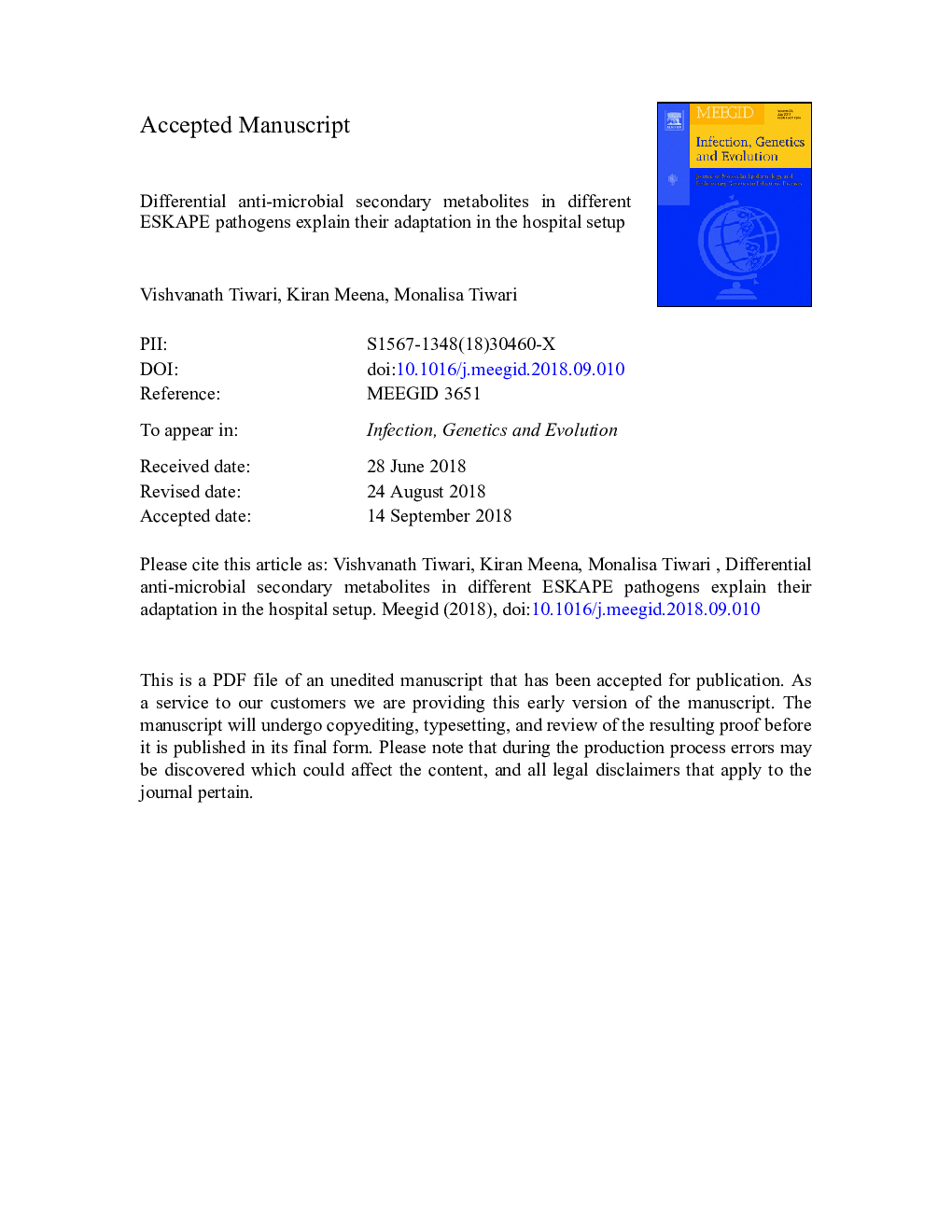| کد مقاله | کد نشریه | سال انتشار | مقاله انگلیسی | نسخه تمام متن |
|---|---|---|---|---|
| 10212432 | 1672910 | 2018 | 30 صفحه PDF | دانلود رایگان |
عنوان انگلیسی مقاله ISI
Differential anti-microbial secondary metabolites in different ESKAPE pathogens explain their adaptation in the hospital setup
دانلود مقاله + سفارش ترجمه
دانلود مقاله ISI انگلیسی
رایگان برای ایرانیان
کلمات کلیدی
ECMBAPDGCBGCESKAPEESKAPE pathogensQSAR - بزرگسال Biosynthetic gene cluster - خوشه ژنی بیوسنتزdiguanylate cyclase - دیگوانیلات سیکلاسQuantitative Structure Activity Relationship - رابطه فعالیت ساختاری کمیGlide - سر خوردنAnti-biofilm - ضد بیوفیلمPASS - عبورNosocomial infections - عفونت های بیمارستانیextra-cellular matrix - ماتریکس خارج سلولیDrug resistance - مقاومت دارویی
موضوعات مرتبط
علوم زیستی و بیوفناوری
علوم کشاورزی و بیولوژیک
بوم شناسی، تکامل، رفتار و سامانه شناسی
پیش نمایش صفحه اول مقاله

چکیده انگلیسی
Nosocomial infections are caused by ESKAPE (E. faecium, S. aureus, K. pneumoniae, A. baumannii, P. aeruginosa, and E. cloacae) pathogens, and their co-existence is associated with their ability to survive in the hospital setup. They may produce molecules, which helps in the better survival of one ESKAPE pathogens over other. We have identified all secondary metabolite gene clusters in six ESKAPE pathogens and predicted antimicrobial and anti-biofilm properties of their product secondary metabolites. To validate our model, we have taken the secondary metabolites of ESKAPE pathogens and studied their interaction with diguanylate cyclase (involved in quorum sensing) and biofilm-associated protein (involved in biofilm formation) of Acinetobacter baumannii. Results suggest the presence of differential secondary metabolites in all ESKAPE pathogens with only three common non-antimicrobial secondary metabolites. Out of twenty-three antimicrobial secondary metabolites, TP-1161, nosiheptide and meilingmycin, showed the best antimicrobial activity and nineteen showed high anti-biofilm activity. Interaction study showed that secondary metabolites produced by other ESKAPE pathogens (non-Acinetobacter) have very good interaction with diguanylate cyclase and biofilm-associated protein of A. baumannii. This concludes that better survival of these ESKAPE pathogens in hospital setup can be correlated with differential production of antimicrobial secondary metabolites. The present study also investigates the molecular mechanism of the competition of different pathogens living in similar hospital setup (similar habitat). Therefore, the present study will initiate research that might lead to the discovery of antibiotics from one ESKAPE pathogen that controls the infection of other ESKAPE pathogens or other pathogens.
ناشر
Database: Elsevier - ScienceDirect (ساینس دایرکت)
Journal: Infection, Genetics and Evolution - Volume 66, December 2018, Pages 57-65
Journal: Infection, Genetics and Evolution - Volume 66, December 2018, Pages 57-65
نویسندگان
Vishvanath Tiwari, Kiran Meena, Monalisa Tiwari,